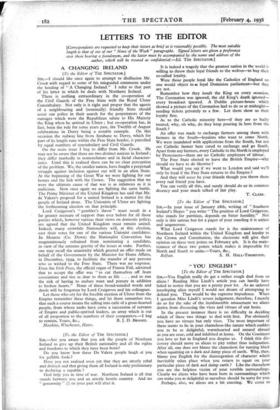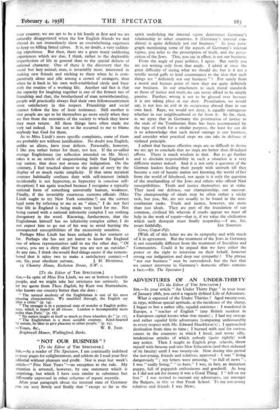"YOU ENGLISH"
[To the Editor of THE SPECTATOR.]
Sra,—You Fnglish really do get a rather rough deal from us aliens ! Reading Miss Lindt's article you can hardly have failed to notice that you are a pretty poor lot. As an unloved interloping alien myself I would not dream of attempting to defend you. That would be the supreme impudence. When I question Miss Lindt's severe judgement, therefore, I merely do so for the sake of the inexhaustible amusement we aliens derive from discussing the vices and virtues of our hosts.
In the present instance there is no difficulty in deciding which of these two things to deal with first. For obviously you have no virtues but only vices. The most important of these seems to lie in your chameleon-like nature which enables you to be as delightful, warmhearted and natural abroad as you are sour, cold and inhibited at home. On the Continent you love us but in England you despise us. I think this dis- covery should move us aliens to pity rather than indignation. After all, one does not blame the chameleon for turning black when squatting on a dark and damp piece of earth. Why, then, blame you English for the disintegration of character which inevitably takes place when you return to squat on your particular piece of dark and damp earth ? Like the chameleon you are the helpless victim of your terrible surroundings. Clearly we aliens who have been born in surroundings which can make you as delightful as ourselves should be sorry for you.
Perhaps, also, we aliens are a bit exacting. We come to your country, we are apt to be a bit lonely at first and we are naturally disappointed when the few English- friends we met abroad do not immediately show an overwhelming eagerness to keep on killing fatted calves. It is, no doubt, a very sadden- ing experience. But then, there are a great many saddening experiences which are due, I think, rather to the deplorable imperfection of life in general than to the special defects of national character. One of these is the discovery that the social but lazy animal, man, is invariably more interested in making new friends and sticking to them when he is com- paratively. alone and idle among a crowd of strangers, than when he is back in his own well-established circle and busy with the routine of a working life. Another sad fact is that the capacity for laughing together is one of the firmest ties of friendship and that, the brotherhood of man notwithstanding, people will practically always find their own fellowcountrymen most satisfactory in this respect. Friendship and social contact follow the line of least resistance. Still another is that people are apt to let themselves go more easily when they are free from the restraints of the society to which they know they must return. All these things have often made me very sad indeed. It has not so far occurred to me to blame anybody but God for them.
As to Miss Lindt's more specific complaints, some of them are probably not without justification. No doubt you English, unlike us aliens, have your defects. Personally, however, I like you rather better for them, not less. If the so-called average Englishman (no reflection intended on Mr. Neve) takes it as an article of unquestioning faith that England is top nation, that does not arouse my indignation. On the contrary, I feel touched almost to the point of envy by the display of so much rustic simplicity. If that same mystical creature habitually confuses duty with self-interest (which incidentally is not hypocrisy, as hypocrisy is conscious self- deception) I am again touched because I recognise a typically national form of something universally human, weakness. Finally, if the invariably courteous customs officials (Miss Lindt ought to try New York sometime !) use the correct legal term by referring to me as an "alien," I do not feel that life in England is being made very hard for me. Not being cursed with a national inferiority complex I see nothing derogatory in the word. Knowing, furthermore, that the Englishman himself has no inferiority complex either, I do not expect him to go out of his way to avoid hurting the unsuspected susceptibilities of the excessively sensitive.
Perhaps Miss Lindt has been unlucky in her contacts so far. Perhaps she has not yet learnt to know the England one of whose representatives Saki- to me the other day, "Of course, you are a dirty alieettut you are not an outsider." At any rate, I think she would find things easier if she remem- bered that it takes two to make a satisfactory contact.—I















































 Previous page
Previous page